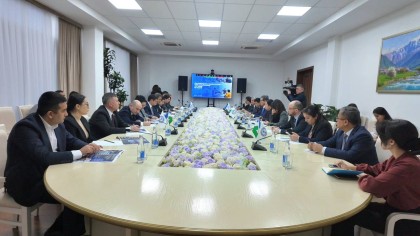The Central Bank of Uzbekistan, with the support of the Asian Development Bank, conducted a survey of financial inclusion and literacy.
It covered 1,200 respondents in six provinces of the country - from Karakalpakstan to Tashkent. Focus groups with 198 participants were separately surveyed, including women, young people and rural residents.
The survey was not for the sake of statistics, but to find how well those things that they like to report on at conferences work in real life: ATMs, cards, loans, applications.
Infrastructure - at the highest level across the CIS countries
Uzbekistan’s financial infrastructure is now one of the densest in the CIS. Over five years, the number of access points has increased by almost 20%.
In Tashkent, 94% of residents are connected to the Internet. In rural areas - 71%. The difference is noticeable, but not fatal. An ATM is no longer a rarity, and something like a kiosk by the road is something we have become accustomed to. But accessibility is not a habit. The machines are there, but not everyone understands how to use tmhe or why.
Savings: not everyone can yet, but many want to
A figure that says a lot about the country: 39% have not put aside a single soum in a year. In Karakalpakstan, this figure is 54%. Among the unemployed, it is 52%. Among the young (18-30 years old), it is 47%. This is a lot. But let's look deeper: among people with higher education, this figure is already 27% (versus 53% who have only completed 8-9 grades of school), and among those working, it is 32%. That is, if there is basic stability, savings also appear.
It is in these disparate figures — 27% and 53% — that the turning point is visible. Somewhere, people are learning to handle money in an app. Somewhere, they are still putting money in an envelope, because they do not know or do not trust any other way.
Loans: not a refusal, but a cautious approach
About 30% of respondents borrowed money, 12% of them from a bank. The rest still turn to friends, relatives, acquaintances. Not because of mistrust, but because of the procedures. The bank requires documents, a stable income, collateral. This is still difficult.
But for those who have a degree and a job, a formal loan is becoming the norm: 28% among those employed and 19% with higher education. This means that the lending system works - but where a person has something to rely on.
Pensioners and the unemployed are still outside the framework: 5% and 7%, respectively, took official loans. Here, the question is not for people, but for the system itself: who it considers a suitable client, and who it simply does not see.
Transfers: support that is not advertised
Another layer is money transfers. Just over half of the respondents receive them regularly: 39% - every month, 12% - once every two months. Most - on a card. But 84% withdraw cash immediately. The habit of cash is still alive and is unlikely to disappear anytime soon.
Nevertheless, 77% of those receiving transfers put aside part of the money they receive. This is not a strategy, but an instinct. Money may be needed at any moment, here they save not “for a vacation”, but “just in case” — illness, wedding, unforeseen trouble.
Financial literacy: theory vs. practice
Financial literacy is growing — 59% have a bank account. And even if only 7.4% put money in it so far — it is important that the infrastructure is there, the knowledge is there, the interface is clear. And behavioral habits come later.
Almost half (47%) of respondents do not use passwords in financial applications, and in the southern provinces more than half do not know what to do if they lose their card. But this is not carelessness. This is a lack of knowledge, habit, confidence, and sometimes — explanations.
The report does not show how everything became perfect, but that the process is underway. Not on schedule and not to the sound of slogans. Confused, uneven, but it is happening. The financial system of Uzbekistan no longer seems alien to people. It just hasn’t become their own yet. And then everything depends not only on the numbers, but also on whether those who collect these numbers will listen to those who create them.













